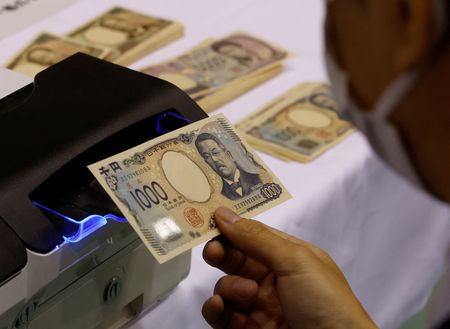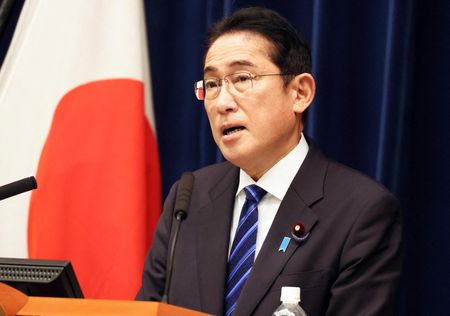By Tetsushi Kajimoto
TOKYO (Reuters) -Japan’s ruling bloc formally agreed on Friday to revise the national tax code for the next fiscal year starting in April, aiming to shift household assets into investment as part of Prime Minister Fumio Kishida’s “new capitalism” agenda.
The ruling Liberal Democratic Party (LDP) and its ally Komeito also endorsed an urgent plan to raise corporate, tobacco and disaster-reconstruction income taxes by 1 trillion yen ($7.3 billion) to help double the defence outlay to 2% of GDP by 2027.
“The tax talks this year were different from a normal year,” LDP tax chief Yoichi Miyazawa told reporters. “What everyone wanted to hear the most is on how the defence tax would go.”
On tax-code reform, Kishida has sought to shift Japan’s 2 quadrillion yen ($14.52 trillion) in household assets away from savings and into investment, under his flagship initiative aimed at redistributing income.
As part of this initiative, the government will make permanent a programme that offers tax breaks for households’ stock investments. It will triple the limit on investments eligible for tax breaks starting in 2024.
As part of symbolic efforts to narrow income disparities, the government will apply in 2025 additional tax for 200 to 300 individuals who earn annual income of above 3 billion yen through investment in stocks and real estate.
PUTTING OFF TAX TALKS
Finance Minister Shunichi Suzuki said on Friday that the defence build-up plan brings it to a different stage in terms of its size and substance, which will mark a “historic turning point.”
He shrugged off the need to issue extra debt to fund the new defence programme, while pledging to do the utmost to achieve a budget surplus in the fiscal year ending in March 2026.
In contrast with steady progress on other tax talks, the ruling coalition stopped short of confirming when to implement the defence tax increases. They effectively put off the decision until next year because of stiff opposition to tax increases from within the LDP as Kishida’s popularity wanes.
“It will be implemented at “an appropriate time” from 2024 onwards,” Miyazawa told reporters on Thursday.
Under the plan, Japan would adopt a corporate surtax of 4%-4.5%, with a deduction of 5 million yen for small firms, while lowering reconstruction income tax to 1%, and imposing a surtax of 1% on incomes for the time being. The tobacco tax will also be raised in stages by 3 yen per cigarette.
Only 6% of all Japanese firms will be subjected to planned corporate tax increases.
As for tax revenue for the next fiscal year, Miyazawa said neither big tax raises nor cuts will be expected in fiscal 2023.
The ruling party officials vowed to ensure disaster reconstruction income tax receipts would not be reduced in supporting those who are suffering from disasters in the northeast, including Fukushima.
($1 = 137.4000 yen)
(Reporting by Tetsushi Kajimoto; Additional reporting by Takaya Yamaguchi, Yoshifumi Takemoto; Editing by Gerry Doyle and Jacqueline Wong)


